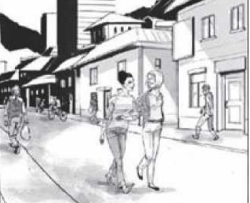Nina was my little sister. She was beautiful - much more beautiful than me, with her black hair and green eyes.
尼娜是我的妹妹。她很漂亮——比我漂亮多了,黑頭發(fā),綠眼睛。
And she was full of life, and clever too. There were always boyfriends at the door, but they changed all the time.
她充滿活力,而且人很聰明。她總有男朋友在門口等候,只不過一直在換人。
Then when she was eighteen, she began to study at the university.
她十八歲時(shí)上大學(xué)。
One day she came home with a smile on her face.
有一天她回到家,臉上掛著笑容。
'What is it, Nina?' I asked. 'You look excited about something. Or is it somebody? Tell me!'
“怎么了,尼娜?”我問,“你一臉興奮,是因?yàn)槭裁词拢€是因?yàn)槭裁慈耍扛嬖V我!”
'I met someone today,' she said happily. 'He's called Dragan and he's studying maths too. And he's... he's wonderful.'
“我今天認(rèn)識了一個(gè)人。”她開心地說,“他叫德拉甘,他也是學(xué)數(shù)學(xué)的。而且,他......他棒極了。”
'That's great, Nina,' I said. 'Where in the city does he live?'
“那很好啊,尼娜。”我說,“他住在城里哪個(gè)地方?”
My sister did not answer this question. She began to talk about a party on Friday night.
我妹妹沒有回答這個(gè)問題。她講起了周五晚上的一個(gè)派對。

I looked at her face carefully. I knew my little sister very well.
我端詳著她的臉。我很了解我的妹妹。
'Nina,' I said. 'Come on, tell me. Where does Dragan live?'
“尼娜,”我說,“來,告訴我,德拉甘住在哪兒?”
Again, Nina said nothing, but I knew the answer.
尼娜又沒有回答,不過我已經(jīng)知道答案了。
It was bad news - bad news for Nina, bad news for our parents, bad news for everyone.
這是個(gè)壞消息——對尼娜、對我們的父母、對任何人來說都是個(gè)壞消息。
Two weeks later, Nina brought Dragan to our house. Dragan was tall and dark, with bright eyes and a quick smile.
兩個(gè)星期之后,尼娜把德拉甘帶到了家里。德拉甘個(gè)子高高的,皮膚黝黑,眼睛明亮,臉上隨時(shí)帶著笑容。
He loved Nina, and she loved him - we could all see that.
他愛尼娜,尼娜也愛他——我們都看得出來。
Dragan had dinner with us, and then we had coffee and talked. Then my father spoke.
德拉甘和我們一起吃了晚餐,然后大家一起邊喝咖啡邊聊天。這時(shí)候我爸爸說話了。












